|
Joe Slovo Squatter Camp
ChiFi cake for SAPS on Christmas Day before squatter camp
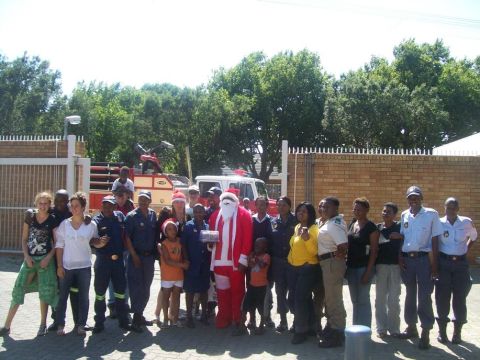
Kids line up for ChiFi Chirstmas in Slovo 25 Dec 2009
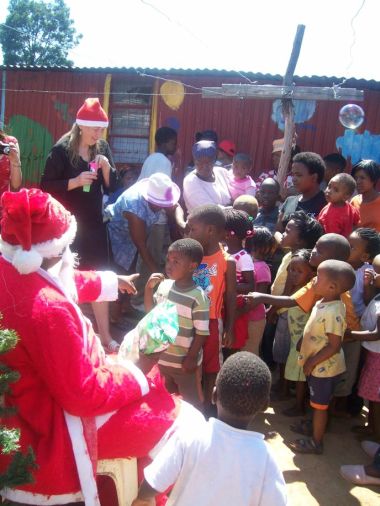
Crowd of kids and Santa in Slovo 25 Dec 2009
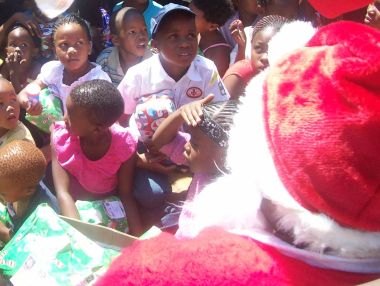
Santa-Cyprian and slightly-too enthusiastic present receivers in Joe Slovo squatter camp 25 Dec 2009
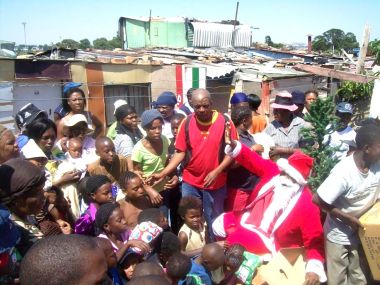
Easter Sunday in Slovo; thanks to donors for the eggs :)

Children of Fire works in Joe Slovo squatter camp, helping residents in numerous ways and often being asked to help translate when people are hospitalised.
On February 24th 2008 we donated a door to Slovo resident Alice Mbanga after her door was kicked in by a drunken wife-beater.
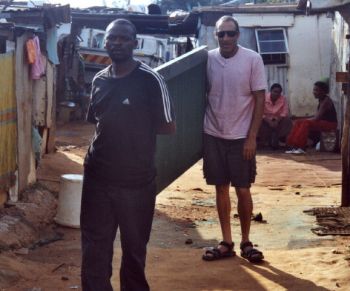
Children of Fire has been working in Joe Slovo squatter camp,
Johannesburg, for more than five years. The focus has been on First Aid
training with St John's Ambulance, Fire Fighting training with Brixton Fire
Brigade as well as fire prevention, St John's home based care, and a host of
other initiatives (see Community Work
section of website).
There were only very small, localised, fires in 2002 and none in January
2003, but Children of Fire maintained constant vigilance and weekly safety
reminders to the community there. Every week throughout 2002 we distributed
300-500 health-advice newspapers obtained from LoveLife and similar
organisations.
Three more residents were trained in fire fighting and fire prevention
during the course of 2002.
Members of the non-political community group Emang Slovo were given
safety candle holders in which the candle floats in water and is extinguished
if the holder is knocked over. Despite this, one woman used the holder without
any water and it then melted! 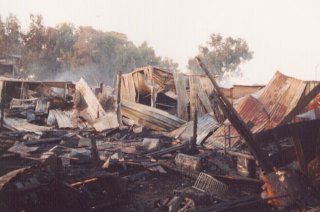
In July 2001 there were two big fires (see also
Water Tanks section of website). The
trainees worked well with the official fire fighters and kept losses to a
minimum. Early reports of a baby dying on July 15th later proved false, but in
the second fire on July 28th 2001 a boy aged four years old suffered flames
burns on his chest, trunk, right cheek and right hand. Thabiso Phosa was taken
initially to Coronation Hospital and later transferred to the Chris Hani
Baragwanath Hospital where he remained until the end of 2001. Our sister
charity The Dorah Mokoena Charitable Trust funded gifts for him as well as
medical and other support when he left hospital, and transport costs for his
relatives to visit him. Thabiso was visiting his aunt and uncle in the squatter
camp for the winter holidays as well as other relatives living in Hillbrow. His
mother Sewella was still finishing her schooling in the Louis Trichardt area
and could not spend time with her child until after her matriculation
examinations.
On the same day that Thabiso was burned, another little boy sleeping
between his parents, was shot dead by a drunk in a neighbouring shack.
Kearabetswe Montlwadi was just five years old.
Alcohol is the major root cause of violence, fires and malnutrition in
the camp. 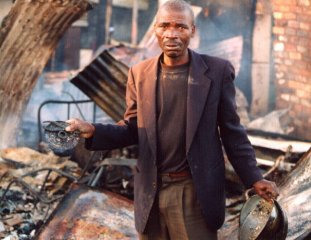
On August 7th 2001, Children of Fire met with Transnet, the owner of the
land on which the squatter camp has been built. We sought their co-operation to
transfer the land to a Section 21 (not for profit) company that would have
members of the squatter camp community on its board as well as other people
prepared to offer their skills pro bono to help the residents. These would
include lawyers who could help with conveyancing work; town planners, etc.
It was then estimated that the commercial value of the occupied land was
some R750,000, and the rates payable on it each month by Transnet were about
R3400. If the illegal landlording could be prevented at Joe Slovo, the
community as a whole would be more than able to pay the rates due. Some
residents rent out shacks to other people for R300 a month and some landlords
own more than 15 shacks. The illegal landlords have no interest in living
conditions improving at Joe Slovo because it would remove their income and some
of them have threatened Children of Fire, its representatives and trainees,
particularly from August to December 2001 and continuing throughout 2002. This
had led to criminal charges being filed at Brixton SAPS for intimidation
against a political committee's members (case 219.9.01) and statements have
been taken that also allege vicarious responsibility belongs to an elected
official in the area. There is also a linked malicious damage to property case.
The police showed extreme reluctance to pursue any of the cases. 
Children of Fire had requested that the social development section of
Transnet should consider building an ablution block for the residents to
replace unhygenic chemical toilets with proper facilities attached to the main
drainage. Such an ablution block should also include showers for men and women
and an area where clothes can be washed and dried, to generate employment for
at least some of the scores of unemployed women living there. Transnet said in
2000/2001 that it could not assist with such facilities because they would be
permanent infrastructure on its land - on land that the company would clearly
have to dispose off in the future.
Curiously, nonetheless, some sector of local government went ahead with
a poor copy of Children of Fire's idea, installing too-shallow and insufficient
gradient plastic-pipe drainage through the camp, which the residents were paid
R60 a metre to dig and install - seemingly without any professional
supervision. There are no man-holes to inspect the drainage as it passes
through the camp.
Also the water pressure is so low to the taps that only one can be used
at a time. Queues for water remain a daily feature of Joe Slovo life and when a
tap washer fails there seems no one inclined or able to fix it.
Flush toilets were installed and on the Coronation side of the camp
there was an immediate problem of theft of components including toilet seats.
Then there were allegations that a so-called sanitation committee and that a
political committee were padlocking individual toilets for their personal use!
Hygienic use of toilets was not understood by all the users.
The toilets at the Ashanti road (Crosby) end of the camp were built
directly under the trees. This is a poor location because the extensive root
network will create repeated problems for the sanitation system.
At a meeting between Children of Fire and various council officials on
September 18th 2002, photographs of illegal installation of permanent
infrastructure on private land were shown, that had been taken the same
morning. All present (including people from Region 4 and two people from
Transnet) denied all knowledge of the installations! By February 2003 there had
still been no follow-up meeting.
People helped us to help the squatters who lost all their possessions
after big fires. Donations included 35 saucepans via Ian McClean and Lions;
towels and clothes from Howard Johnston of Rosebank Rotary; clothes and 40
blankets from Investec Cradle Group and individual donations from Bronwen
Jones, her immediate neighbours in Auckland Park, Niva Waldeck, Louise Aarts,
Carolyn Projansky and Melodie Sinton-Hewitt.
Disaster Management also provided blankets and Rehanna, a woman
associated with a political party, called on the neighbouring Moslem
organisations to assist with soup and bread in the short term. David Oliphant,
police commissioner for Brixton, provided some fifty old-style SAPS jackets to
people who had lost their homes.
Donations were distributed as fairly as possible to people who had lost
possessions. As far as we are aware there was only one significant misdirection
of resources. This was through a woman called Martha, who decided that she and
her family should live in the crèche shack to supervise the handling of
donations - even though it later became clear that she had lost nothing in the
fire. Martha managed to secure five SAPS jackets for her relatives and other
clothing as well. 
To the best of our knowledge, the people (and their shack nos) who lost
their possessions in the first fire were: Aaron Rambuda (314), Dorah Rambuda
(314), Maggie Rambuda (314), Freddy Rambuda (314) Chihilo Rambuda (314)
Thsulufelo Rambuda (314), Mamunuani Modise, Daniel Lefu Radebe, Tebugo Mokoena
(315), Aron Sibiya (316), Marli Shabangu (316b), George Makoloko (318a), Alex
Ndlovu (319), Liliehi Liburu (320), Suzani Molawuli (320a), Siguphutso (320b),
Gladdysi Modise (300a), Bricks Jonas Migwa (320a), Rafad Shangu (320), Peter
Tsime (300a), Gloria Raphuleng (318b), Saule Libonu (318), Japhi Libonu (318),
Priscila Sirebule (321), Johannes Silothego (361a), Masigo Modisane (361a), Neo
Moremeli, David Hlomelang, Thabo Khayile, Michael Mafukeng (322), Christina
Mofokeng (322), Joyce Limtsi (320c), Jacob Tseko (320b), Hilda Habanakhosi
(320c), Vivian Habanakhosi (320c), Joseph Lieto (320c), Lazarus Tlou (357),
Nofenishola Konfo (358), Sharewell Mthlali (358), Ellen Mutsalina (367b),
Prince Mpenduleni (364), Faniel Ragwali (364b), Bakang Joseph Mpenduleni (365),
Bakeng Habankhosi (367a), Phillimon Nemakhonde (367), Cecilia Totse (366), Tso
(367a), Joseph Mukwebo (364), Elizabeth Masibi (316), Gert Tume (318) and David
Tume (318).
In the second fire, the people who lost many or all of their possessions
were: Lindiwe Monnemang (147), Alfred Monnemang (147a) Linda Monnemang (147b),
Dineo Mannemang (147b), Patrick Sedumedi (155), Ndaki Ntantiso (147a), Noswephi
Ntantiso (147a), Ntombi Dumiso (147c), Lindiwe (147c), Seawater (147c),
Sthembiso (147c), Molefe (146), Sophie Tswaile (148), Ben Tswaile (148), Portia
Mukhosi (151), Manomo (151a), Keaboka Mukhosi (151b), Mmapule Sithudu (153a),
Ubakeng Liepho (148e), Mkani (148c), Buc Moloi (148), John Silabeli (147a),
Shadrick Rakhometsi (151b), Daniel Simusa (148), Edwin Ntshidi (143c), Bobi
Lojani (145), William Sinaphani (154), Simon Moemeleng (140), Suzan Moemeleng
(140), Cindy Moemeleng (140), Betty Moemeleng (141a), Jack Moemeleng (141a),
Palal Mtali (143), Senah Abi (143a), Eddy Abi (143a), Maria Abi (143a), Robert
Mayimere (142), Rosinha Malafti (142), Joshua Malafti (142), Joyce Mahloko
(148c), David Mohloko (148c), Pam Mtili (143), Michael Koikoi (141), Maltatsi
Koikoi (141), Mahlo Mtambo (144e), Selina, Alfred Maanciwana (144), James Phosa
(144b), Merila Phosa (144b), Bongiwe Maanelwana (144), Simon Mhlongo (144d),
Dudu Ngwenya (144c), Nothando Buthelezi (144c), Zindela Ndabenzima (144a).
James Phosa is the uncle of Thabiso, the little boy hospitalised with
his chest burns. James burned his leg while rescuing him and was briefly
hospitalised for a breakdown/depression after the incident. Children of Fire
later secured him employment on four days a week.
Helping people to rebuild their lives continued more than 30 months
after the fires. There is little official help available but fortunately we
estimate that half the people affected have some sort of employment, even if it
is only piece jobs (part-time work). Families like the Rambudas lost of lot
including gas fridges, two generators, liquor and sewing machines, but they
still own a lot elsewhere and have a steady income from landlording. They run
businesses in Thoyandu and do not need to live in squatter camps at all.
There was a further small fire around 11am on Friday September 14, 2001.
This occurred because a woman called Betty left her primus stove on while she
went to play cards. Three shacks were burned but swift use of the firefighting
water tank prevented any more widespread damage. Children of Fire called
Brixton fire brigade to refill the water tank the next morning, which they
gladly did.
Cnitsi Masoko and George Seretsi Mokamane, both from one affected shack
(no 335) were each given two blankets from Children of Fire (sourced from the
Investec Cradle Group). Betty has been hospitalised for a breakdown - possibly
because her neighbours had suggested that she must pay for their possessions
damaged by her alleged preoccupation with gambling.
On Tuesday September 18 2001, at noon, the water supply was cut off at
the camp for unknown reasons and we were fearful that people might use the
firefighting water as nothing else was available for their general use.
In December 2001 ten additional firefighting water tanks were to have
been donated to the community. Despite pleas direct to the office of Amos
Masondo, Mayor of Johannesburg, troublemakers David Masilo and his accomplice
Thomas, chased the R50,000 donation away. The ward councillor was alleged to
have told them to prevent delivery and a request to him to co-operate in the
safety initiative by Marvi Phanyane of the Mayor's office, was ignored. The
police were ineffective in handling the incident as it was simply a small group
of inebriated unarmed people with two less-than inspired ringleaders,
toyitoyi-ing (dancing to and fro) and another sober serious group of the same
size saying that they really did want the tanks delivered.
Children of Fire subsequently gave the tanks to Benoni and the
Alexandra.
Slovo Entrepreneur Project
In order to make communities safer and in particular, squatter camp communities, there needs to be gainful employment for residents. If people have purpose and income, they are less likely to sit around and play cards and dice and lose what little money they have. Gambling, especially when combined with drinking, leads to serious social problems, violence, and money that is needed to feed and clothe children, not being available.
Through linking with Investec's inner city university and various adult education courses, Children of Fire has been able to send different adults from Joe Slovo squatter camp and also from Zevenfontein and parts of Alexandra, on courses on effective entrepreneurship, painting and similar skills.
There are many skilled and semi-skilled people in squatter camps who just need that chance to make their businesses more formal. Lots of small shopkeepers sell their wares to fellow residents and visitors. They also build and furnish shacks for others and provide services like shoe repair.

Furniture makers in Slovo, October 2005
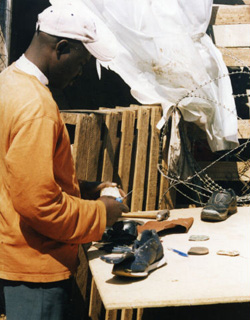
Shoe repairer in Slovo, October 2005
Slovo Sunday Library/children at play
Children of Fire has been working in Joe Slovo squatter camp for nearly ten years. We have a long term "Sunday Library" outdoor reading project. It used to be indoors until political intimidation made use of the library shack untenable. Now the children learn life skills, about fire prevention and wider community safety issues, draw, read and often receive second hand toys to play with.

October 2nd, 2005. Children play with cars and alphabet letters at Children of Fire's Sunday Library.
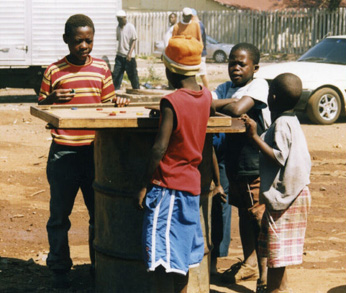
October 2005. Slovo children play flickfinger snooker
|